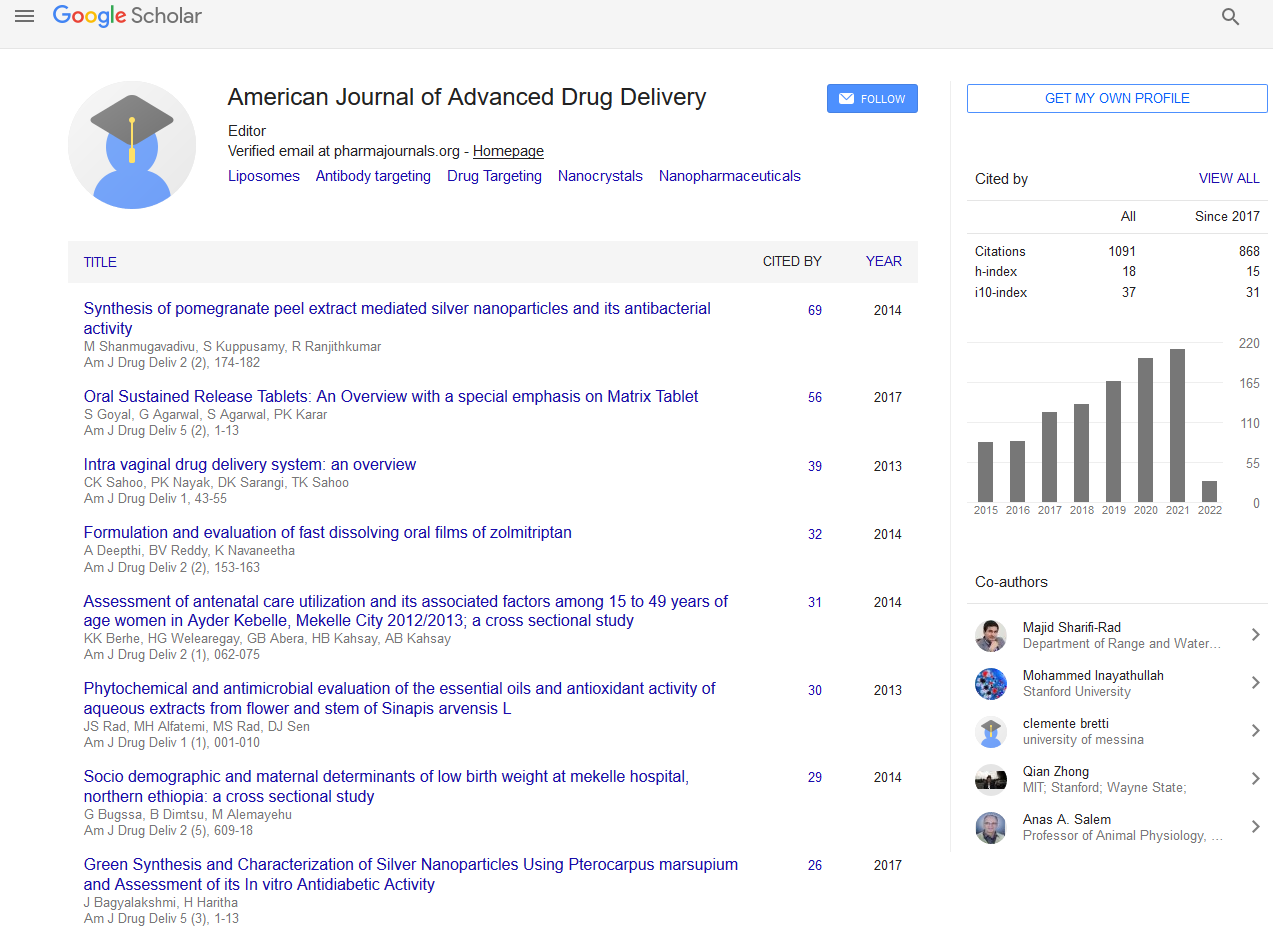Short Communication - (2023) Volume 11, Issue 3
Navigating Drug Delivery Issues: Challenges and Solutions
Bao Chai*
Department of Medical Sciences, California University, USA
*Correspondence:
Bao Chai,
Department of Medical Sciences, California University,
USA,
Email:
Received: 30-Aug-2023, Manuscript No. IPAAD-23-18213;
Editor assigned: 01-Sep-2023, Pre QC No. IPAAD-23-18213;
Reviewed: 15-Sep-2023, QC No. IPAAD-23-18213;
Revised: 20-Sep-2023, Manuscript No. IPAAD-23-18213;
Published:
27-Sep-2023, DOI: 110.36648/2321-547X.11.3.29
Introduction
Drug delivery is a critical aspect of healthcare that ensures the
effective administration of medications to patients. It plays a
pivotal role in the success of medical treatments and therapies.
However, the field of drug delivery is not without its challenges.
Various issues can hinder the efficient and safe delivery of drugs,
impacting patient outcomes and healthcare costs. In this article,
we will explore some of the key drug delivery issues and discuss
potential solutions to overcome them.
Description
One of the foremost challenges in drug delivery is patient compliance.
Many patients fail to adhere to their prescribed medication
regimens, either by missing doses or discontinuing treatment
altogether. This non-compliance can lead to suboptimal therapeutic
outcomes and increased healthcare costs. To address this
issue, healthcare providers and pharmaceutical companies are
exploring strategies such as developing long-acting formulations,
utilizing mobile health apps for reminders, and offering educational
programs to improve patient understanding and engagement.
The effectiveness of a drug greatly depends on its ability
to be absorbed and reach the target site within the body. Poor
absorption and low bioavailability can render even the most
promising drugs ineffective. These issues often arise due to the
drug’s physicochemical properties or the patient’s physiology. To
enhance absorption, drug developers are working on nanotechnology-
based drug carriers, prodrugs, and innovative formulation
techniques that improve solubility and stability, ultimately
boosting bioavailability and efficacy. Some drugs are highly susceptible
to degradation when exposed to environmental factors
such as heat, light, or moisture. This poses a significant challenge,
particularly in areas with unstable climatic conditions. Proper
storage and transportation are crucial to maintain the integrity of
pharmaceutical products. Pharmaceutical companies are investing
in advanced packaging technologies and developing more
stable drug formulations to mitigate degradation risks during
storage and transportation. Antibiotic resistance is a growing
global concern. The overuse and misuse of antibiotics have led
to the emergence of drug-resistant strains of bacteria, making
it difficult to treat infections. The development of new antibiotics
and antimicrobial agents is essential to combat this issue.
Researchers are exploring alternative treatment options, such
as phage therapy and combination therapy, to address antibiotic
resistance and ensure effective drug delivery. In some cases,
drugs are needed to act specifically at certain target sites within
the body. Achieving this level of precision in drug delivery can
be challenging. Systemic administration often results in off-target
effects and potential toxicity. Advances in nanomedicine and targeted
drug delivery systems are improving the precision of drug
administration, reducing side effects, and enhancing therapeutic
outcomes. These systems include nanoparticles, liposomes, and
monoclonal antibodies designed to deliver drugs directly to the
intended site [1-4]. The pharmaceutical industry faces stringent
regulatory requirements and approval processes, which can be
time-consuming and costly.
Conclusion
These hurdles may delay the introduction of new drugs and innovations
to the market, affecting patient access to cutting-edge
therapies. Efforts to streamline regulatory pathways and foster
collaboration between industry stakeholders, regulatory bodies,
and healthcare providers are essential for expediting the approval
of new drug delivery technologies and therapies.
Acknowledgement
None.
Conflict Of Interest
The author’s declared that they have no conflict of interest.
References
- Gorter, Thomas M (2016) "Right ventricular function after acute myocardial infarction treated with primary percutaneous coronary intervention (from the glycometabolic intervention as adjunct to primary percutaneous coronary intervention in ST-segment elevation myocardial infarction III trial)." Am J cardiol 118(3): 338-344.
[Crossref] [Google Scholar]
- Kanar BG, Tigen MK, Sunbul M, Cincin A, Atas H, et al. (2018) The impact of right ventricular function assessed by 2-dimensional speckle tracking echocardiography on early mortality in patients with inferior myocardial infarction. Clin Cardiol 41(3): 413-418.
[Crossref] [Google Scholar]
- Zavaleta NS, Velasquez PJ, Nieto RG, Camacho GC, Pinot ES, et al. (2022) Right atrial and right ventricular function assessed by speckle tracking in patients with inferior myocardial infarction. Rev Cardiovas Med 23(4): 123.
[Crossref] [Google Scholar]
- Anavekar NS, Skali H, Bourgoun M (2008) Usefulness of right ventricular fractional area change to predict death, heart failure, and stroke following myocardial infarction (from the VALIANT ECHO Study). Am J Cardiol 101:607-612.
[Crossref] [Google Scholar]
Citation: Chai B (2023) Navigating Drug Delivery Issues: Challenges and Solutions. Am J Adv Drug Deliv. 11:29.
Copyright: ©2023 Chai B. This is an open-access article distributed under the terms of the Creative Commons Attribution Li�cense, which permits unrestricted use, distribution, and reproduction in any medium, provided the original author and source
are credited.

